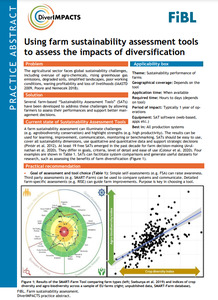{Tool} Using farm sustainability assessment tools to assess the impacts of diversification (DiverIMPACTS Practice Abstract). [Anwendung von Tools zur Nachhaltigkeitsbewertung, um die Vor-und Nachteile der Diversifizierung landwirtschaftlicher Betriebe zu beurteilen (DiverIMPACTS Practice Abstract).] Creator(s): Curran, Michael. Issuing Organisation(s): FiBL - Research Institute of Organic Agriculture. (2022)
|
PDF
- Published Version
- English
270kB | |
|
PDF
- Published Version
- German/Deutsch
269kB | |
![[thumbnail of 2022-08-01 20_59_43-Protokoll.png]](/44348/3.hassmallThumbnailVersion/2022-08-01%2020_59_43-Protokoll.png)  Preview |
Image (PNG)
- Cover Image
- English
254kB |
|
PDF
- Published Version
- French/Francais
337kB |
Document available online at: https://zenodo.org/record/6320530#.Yuggl3ZBw2w
Summary in the original language of the document
A farm sustainability assessment can illuminate challenges
(e.g. agrobiodiversity conservation) and highlight strengths (e.g. high productivity). The results can be used for learning, improvement, communication, monitoring or benchmarking. SATs should be easy to use, cover all sustainability dimensions, use qualitative and quantitative data and support strategic decisions (Pintér et al. 2012). At least 19 free SATs emerged in the past decade for farm decision-making (Arulnathan et al. 2020). They differ in goals, criteria, level of detail and ease of use (Coteur et al. 2020). Four examples are shown in Table 1. SATs can facilitate system comparisons and generate useful datasets for research, such as assessing the benefits of farm diversification.
Summary translation
Die Nachhaltigkeitsbewertung eines landwirtschaftlichen Betriebs kann Probleme (z. B. den Erhalt der Agrobiodiversität) und Stärken (z. B. hohe Produktivität) aufzeigen. Die Ergebnisse können zur Betriebsoptimierung, Monitoring, Kommunikation oder dem Vergleich mit anderen Betrieben genutzt werden oder zum Lernen anregen. Die Tools sollten einfach anwendbar sein, alle Nachhaltigkeitsdimensionen abdecken, qualitative und quantitative Betriebsdaten nutzen und bei strategischen Entscheidungen unterstützen (Pintér et al. 2012). In den letzten zehn Jahren wurden mehr als 19 kostenlose Tools entwickelt, die bei der Entscheidungsfindung auf landwirtschaftlichen Betrieben unterstützen können (Arulnathan et al. 2020). Sie unterscheiden sich in Bezug auf Ziele, Kriterien, Detailgrad und Benutzerfreundlichkeit (Coteur et al. 2020). Vier Beispiele sind in Tabelle 1 aufgeführt. Die Methoden können auch den Vergleich von unterschiedlichen Produktionssystem erleichtern oder Daten liefern, die in der Forschung genutzt werden, z. B. für die Bewertung der Vor- und Nachteile der Diversifizierung landwirtschaftlicher Betriebe.
| EPrint Type: | Practice tool |
|---|---|
| Teaser: | Assess your performances and make better management decisions. |
| What problem does the tool address?: | The agricultural sector faces global sustainability challenges, including overuse of agro-chemicals, rising greenhouse gas emissions, degraded soils, simplified landscapes, poor working conditions, waning profitability and loss of livelihoods. |
| What solution does the tool offer?: | Several farm-based “Sustainability Assessment Tools” (SATs) have been developed to address these challenges by allowing farmers to assess their performances and support better management decisions. |
| Country: | Switzerland |
| Type of Practice Tool: | Practice abstracts |
| Keywords: | farm management, diversification, viodiversity, decision support systems |
| Agrovoc keywords: | Language Value URI English farm management UNSPECIFIED English diversification http://aims.fao.org/aos/agrovoc/c_2344 English biodiversity http://aims.fao.org/aos/agrovoc/c_33949 English decision support tools -> decision support systems http://aims.fao.org/aos/agrovoc/c_49868 |
| Subjects: | Farming Systems > Farm economics Environmental aspects > Biodiversity and ecosystem services |
| Research affiliation: | Switzerland > FiBL - Research Institute of Organic Agriculture Switzerland > Sustainability > Sustainability assessment European Union > Horizon 2020 > Diverimpacts European Union > Organic Farm Knowledge |
| Horizon Europe or H2020 Grant Agreement Number: | 727482 |
| Related Links: | https://organic-farmknowledge.org/tool/44348, https://organic-farmknowledge.org/tool/39608, https://organic-farmknowledge.org/tool/39114, https://twitter.com/farm_knowledge/status/1597914949472653312, https://www.facebook.com/organicfarmknowledge/posts/pfbid0HjHEhCo29TrAxf2ix5b3qNpimdGiSVc2iD6ubCJp9zQHxkA381WVsm2wNExkvrSyl |
| Project ID: | ofk |
| Deposited By: | Rüger, Madelaine Lea |
| ID Code: | 44348 |
| Deposited On: | 02 Aug 2022 07:25 |
| Last Modified: | 02 May 2024 10:31 |
| Document Language: | German/Deutsch, French/Francais |
| Status: | Published |
Repository Staff Only: item control page

 Download Statistics
Download Statistics Download Statistics
Download Statistics
